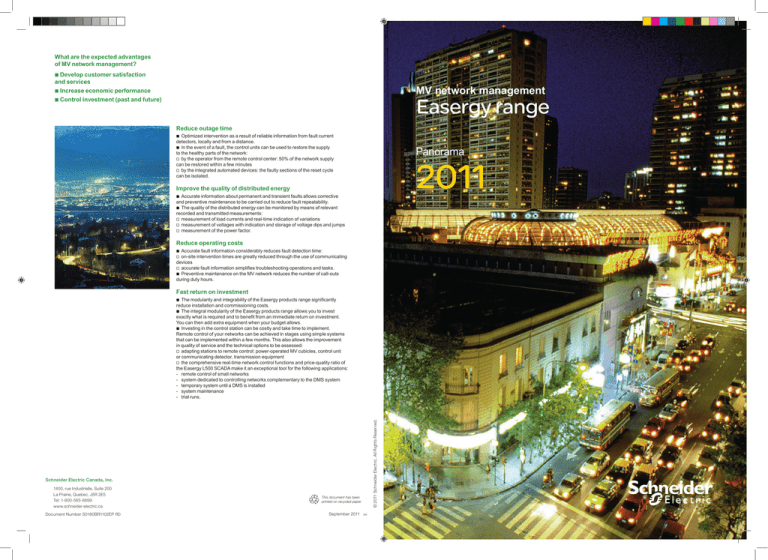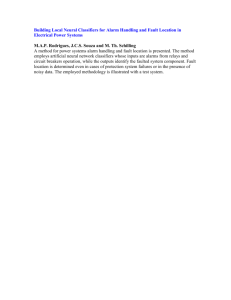
What are the expected advantages
of MV network management?
b Develop customer satisfaction
and services
b Increase economic performance
b Control investment (past and future)
MV network management
Easergy range
Reduce outage time
b Optimized intervention as a result of reliable information from fault current
detectors, locally and from a distance.
b In the event of a fault, the control units can be used to restore the supply
to the healthy parts of the network:
v by the operator from the remote control center: 50% of the network supply
can be restored within a few minutes
v by the integrated automated devices: the faulty sections of the reset cycle
can be isolated.
Panorama
2011
Improve the quality of distributed energy
b Accurate information about permanent and transient faults allows corrective
and preventive maintenance to be carried out to reduce fault repeatability.
b The quality of the distributed energy can be monitored by means of relevant
recorded and transmitted measurements:
v measurement of load currents and real-time indication of variations
v measurement of voltages with indication and storage of voltage dips and jumps
v measurement of the power factor.
Reduce operating costs
b Accurate fault information considerably reduces fault detection time:
v on-site intervention times are greatly reduced through the use of communicating
devices
v accurate fault information simplifies troubleshooting operations and tasks.
b Preventive maintenance on the MV network reduces the number of call-outs
during duty hours.
35 Rue Joseph Monier
CS 30323
92506 Rueil Malmaison Cedex
Schneider
Canada,
Tel : +33Electric
(0)1 41 29
70 00 Inc.
Fax : +33 (0)1 41 29 71 00
1400, rue Industrielle, Suite 200
La
Prairie, Quebec, J5R 2E5
www.schneider-electric.com
Tel: 1-800-565-6699
www.schneider-electric.ca
Document
Number S0180BR1102EP R0
AMTED107018EN
© 2011 Schneider Electric. All Rights Reserved.
Schneider Electric
ART.832397 © Schneider Electric Industries SAS - All rights reserved
Fast return on investment
b The modularity and integrability of the Easergy products range significantly
reduce installation and commissioning costs.
b The integral modularity of the Easergy products range allows you to invest
exactly what is required and to benefit from an immediate return on investment.
You can then add extra equipment when your budget allows.
b Investing in the control station can be costly and take time to implement.
Remote control of your networks can be achieved in stages using simple systems
that can be implemented within a few months. This also allows the improvement
in quality of service and the technical options to be assessed:
v adapting stations to remote control: power-operated MV cubicles, control unit
or communicating detector, transmission equipment
v the comprehensive real-time network control functions and price-quality ratio of
the Easergy L500 SCADA make it an exceptional tool for the following applications:
- remote control of small networks
- system dedicated to controlling networks complementary to the DMS system
- temporary system until a DMS is installed
- system maintenance
- trial runs.
As standards, specifications and designs change from time to time, please ask for confirmation
of the information given in this publication.
This document has been printed
on ecological paper
Publishing: Schneider Electric Industries SAS
Design: Schneider Electric Industries SAS
Printing: Imprimerie du Pont de Claix/JPF - Made in France
This document has been
printed on recycled paper
September
2011
01-2011
sw
Easergy range Panorama
Easergy: a range of solutions for MV network management
Easergy range
Remote network
dedicated supervisor control
Remote network
monitoring
L500
T200 P
T200 I
T200E
Easergy range dedicated
remote control system
Overhead switch
control unit
Capacity:
500 Easergy type devices
Control of 1 or 2
switches
Main functions
b Network view with substation
alarm
b Detailed substation view
b Alarm logs, archives
b Direct access to substation
view via a list
b Automatic sorting of alarms
and archives by substation
b Online help
b Pole mounted
b Wall-mounted b Ringmastermounted
b Switch monitoring and control
b Fault current detector
b Automation systems: sectionaliser,
power supply source changeover switch
b Measurements: I, U, b Measurements: I, U
P, Q, S, energy and
power factor cos j
Local fault
indication
Flite 116-SA/G200
Flair 200C
Flite 110-SA
Control unit for MV and MV/LV
substations
Communicating fault
current detector for
overhead lines
Communicating fault
current detector for an
MV substation
Fault current detectors for an overhead network
Control of 1 to 16
switches
Single-phase ammetric
detector
Three-phase, 2 channel
fault current detector open
to all types of earthing
system
Single-phase ammetric
detector
Three-phase ammetric
detectors
Three-phase directional
detectors
DIN format three-phase
ammetric detectors
Three-phase ammetric
detectors
Three-phase directional
detectors
Flite 116:
b Line installation
b Phase-to-phase and
phase-to-earth fault current
detection
b I and U presence
measurements
b Communication
management with G200
b Powered by lithium battery
G200:
b Pole-mounted
b Flite 116 concentrator
b Processing and archiving
b Free I/O: 3 digital outputs
and 6 digital inputs
b 220 Vac, solar or 12 Vdc
supply
b Wall-mounted
b Phase-to-phase and
phase-to-earth fault current
detection
b U, I, P, Q, S, energy and
power
factor measurements cos φ
b Management of 3 digital
outputs and 6 digital inputs
b 220 Vac supply backedup by Ni-CD battery
b Concentration of Modbus
communication devices
b Data and measurements
archives
Main functions
b Line installation
b Pole-mounted
b Pole-mounted
b Wall-mounted
b Wall-mounted
b Phase-to-phase and
phase-to-earth fault
current detection
b Indication of transient
and permanent faults
b Phase-to-phase and
phase-to-earth fault
current detection
b Indication of transient
and permanent faults
b Phase-to-phase and
phase-to-earth fault
current detection
b Transient and/or
permanent fault indicator
b Fault counter
b Incorporated in the
switchgear
b Phase-to-phase and
phase-to-earth fault
current detection
b Measurements:
v ammeter
v maximeter
Phase-to-phase and
b �������������������
phase-to-earth fault
current detection
b Phase-to-phase and
phase-to-earth fault
current detection
b Indication of transient
and permanent faults
b Powered by lithium
battery
b Powered by lithium
battery
b Powered by lithium
battery, solar panels or
12 Vdc depending on
model
b Self-powered by
current sensors
b Power supply:
v Flair 279: 220 Vac
(battery-backed)
v Flair 219: battery
Power supply:
b �������������
230 Vac backed up by
battery or external
depending on model
b 1 to 2 serial communication ports
b 1 Ethernet port
b Communication port operation
management
b Transmission interface: PSTN, radio, GSM, GPRS, Ethernet,
dedicated line, RS232, RS485
b 915 MHz short range radio
communication
b 1 SCADA communication
port
b Transmission interface:
radio, GSM, GPRS, CDMA
b 1 communication port
b 1 Ethernet port (option)
b Transmission interface:
PSTN, Radio, GSM, GPRS,
Ethernet, RS232, RS485
Option: signalling
b �������������������
contact for RTU
b ��������������������
Signalling contacts
for RTU
b �����������������������
Signalling contact for
RTU
b �������������������
Signalling contact
for RTU
b �������������������
Signalling contact
for RTU
b IEC 870-5-101 and IEC 870-5-104
b Serial DNP3 and TCP/IP
b Serial Modbus and TCP/IP
b Other proprietary protocols
b IEC 870-5-101
b Serial DNP3 and TCP/IP
b Modbus
b IEC 870-5-101
b DNP3
b Modbus
Data configuration
b Professional communications
and database editor
b Data creation via dialogue
boxes
Embedded web server
b �������������������
Local and remote configuration
b ������������������������������
b Local and remote
configuration with Easergy
L500
b Local or remote
configuration
b Embedded web server
b By micro-switches
b Configurable via
display unit
b By micro-switches
b By micro-switches
or button and display unit
b Configurable via
display unit
Accessories
b Radio, PSTN, DL and
fibre optic modems
b Simulation tools and tests
b Installation tool
b Open phase and zero
sequence sensors
b Open phase and zero
sequence sensors
b Unit for wall-mounting
b Open phase and zero
sequence sensors
Control of 4
switches
b Concentration of Modbus communication devices
b Data and measurements archives
b Back-up power supply for control unit,
switch and transmission equipment
Communication
b Integrated communication
front-end
b Permanent and nonpermanent communications
management:
v telephone/GSM
v radio
v direct public and dedicated
private line
b Periodic call management
Communication protocol
b Modbus
Flite 210, 230
Flite 312, 315, 332,
335, 382
Flair 21D, 22D, 23DV Flair 219, 279
Flair 310, 370
Fault current detectors for MV substations
Communication
b Open phase
and zero
sequence sensors
Data configuration
b By micro-switches
Accessories
b Installation tool
b Open phase and zero
sequence sensors


